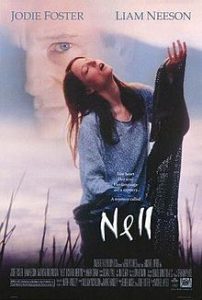Theme That Mirrors Real Life
Today’s post is a reprint from 10 years ago. Theme is so important in a work of fiction, so dig in and learn how this exceptional film can help you develop theme in your story.
Nell is an amazing movie. Brilliant on so many levels. The plot itself is wonderful and enough to drive the story. But we see again another story where there is a theme underlying the plot.
Nell is not just about a girl who has spent most of her life in isolation. In Nell, we are put face-to-face with the question about our place in the world—what is considered normal and sane in the way we live our lives. Two forces fight over Nell—those who want to let her keep her freedom, intent on proving that she can not just survive but thrive without society. And the others, those in “authority,” who insist Nell cannot care for herself, that she has to have others tell her what to think, eat, dress, how to act, and how to live in a way that is not just acceptable but healthy.
Nell is a young woman raised in the back country, who has never encountered or interacted with any people other than her family (don’t want to do a spoiler here). A delivery boy discovers her right after her mother has died, and that tragedy has left Nell bereaved and alone. A doctor is asked to go talk with her, and thus begins the story of how Jerry, and then Paula, live on the property and study Nell, trying to communicate with her and assess her mental and emotional state.
Does Nell need to be put in a state home? Or can she live on her own. Who has the right to decide?
Small Things Are Big—and Not Just in Nell
Nell threatens the established norms, and as Jerry and Paula take her to court, in despair over her fate, Nell actually speaks up—in her strange manner of talking (because her mother, who had a stroke that impaired her speech, raised her with a warped version of English).
To everyone’s shock, Nell presents herself, with the help of Jerry’s translating, as an intelligent, intuitive person. But most importantly, she understands the heart of life—what scares us, what moves us. Nell tells us that she knows small things—her world is small. And that her listeners know big things, there in the city, in the big world.
Yet, she sees how no one will look each other in the eye. She sees everyone’s hunger for connection, for love, and asks why their world hasn’t given them either hope, love, or answers. She tells them she knows what it’s like to love and to lose those she loves. She makes it clear she is no different from anyone else. But she can accept that those things are part and parcel of life. If that scene doesn’t move you to tears, I would be shocked.
Nell Mirrors Real Life
 In this beautiful, haunting speech, she reveals she knows far more than most of her listeners. She has a wisdom that comes from reflection and true living. She doesn’t just live in her world, she embodies it. She puts her opposers to shame with her honesty and compassion—something starkly lacking in those seeking to constrain her “for her own good.”
In this beautiful, haunting speech, she reveals she knows far more than most of her listeners. She has a wisdom that comes from reflection and true living. She doesn’t just live in her world, she embodies it. She puts her opposers to shame with her honesty and compassion—something starkly lacking in those seeking to constrain her “for her own good.”
One of the minor characters, a deputy, has a troubled, depressed wife. He is racked with pain, unable to find a way to help her, to show her how to find joy and peace in her life. Yet, when this woman meets Nell, she finds the help she seeks. Just watching Nell, talking to her, and being comforted by this young woman, is the cure she needs. And there’s a poignant moment in the movie in which this woman looks at Paula, the state psychologist sent to assess Nell, and she says, “You were the first one to need her.”
Nell brings out many things in the people around her. They think they’re there to help her, but the opposite is true. They each need to learn something about their fears and hang-ups, and Nell mirrors them innocently back to them. Everyone who gets around Nell is changed, just by virtue of her genuineness.
Deep Themes below the Drama
So, what theme is going on here?
I see it as this: Nell is considered helpless and unfit. Society is needed to tell us how to live and function, and we must be a compliant participant in order to not just survive, but to enjoy life. Life has rules and we’re meant to follow them. Rules=happiness.
The theme is  that these are falsehoods. That sanity, happiness, functionality have nothing to do with society but have to do with your heart. That you can throw out every rule that doesn’t speak to your heart because, in the end, those rules will not serve you or anyone else. That you have to face your fear and your pain to get to the raw truth of who you are. And that’s too scary for most people, yet Nell, of all people, is there. She embraces her pain and loss in a beautiful acknowledgment that this is life—in all its beauty and despair. She challenges each one of us—can we live so honestly?
that these are falsehoods. That sanity, happiness, functionality have nothing to do with society but have to do with your heart. That you can throw out every rule that doesn’t speak to your heart because, in the end, those rules will not serve you or anyone else. That you have to face your fear and your pain to get to the raw truth of who you are. And that’s too scary for most people, yet Nell, of all people, is there. She embraces her pain and loss in a beautiful acknowledgment that this is life—in all its beauty and despair. She challenges each one of us—can we live so honestly?
How’s that for a BIG theme?
This week, watch Nell, if you haven’t seen it, or watch it again and jot down the moments when the themes come front and center. See if you can catch any subtler themes as well. A story without theme often is a story without heart. So be sure to consider possible themes in your story!
And if you don’t have my book Writing the Heart of Your Story, you can purchase it HERE! You’ll learn how to get to the heart of your story via your theme!











